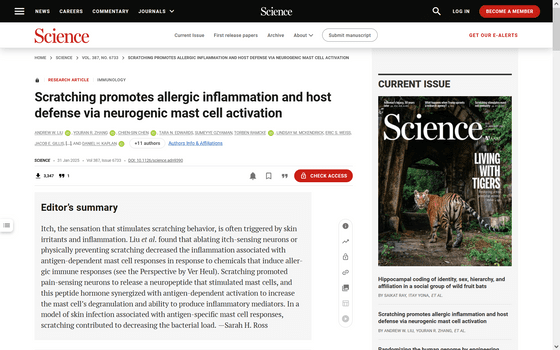Is there any scientifically proven downside to scratching itchy parts of your body?

When your body is itchy, you have to scratch it, which is a natural human reaction, and it's nothing strange about it. However, scratching too much can cause bleeding or injury, so there is a limit to how much you can scratch. Daniel Kaplan, MD, of the University of Pittsburgh, explains the disadvantages of scratching.
Scratching promotes allergic inflammation and host defense via neurogenic mast cell activation | Science

Why You Shouldn't Scratch an Itchy Rash: New Study Explains
Is there a benefit to scratching that itch? Yes and no, says new study
https://newatlas.com/health-wellbeing/scratching-itch-benefit/
Itching caused by insect bites, rashes, and skin diseases can sometimes be so intense that it feels impossible to stop scratching. The act of scratching feels very good, and since it is accompanied by a pleasurable sensation, it is natural to think that it evolved in this way because it has some beneficial benefits. However, scratching the body has many disadvantages, such as damaging the skin and creating the possibility of infection, so Kaplan conducted a study to determine whether scratching is actually a good thing or a bad thing.
Kaplan and his team prepared normal mice and mice that did not feel itchy because they lacked itch-sensing neurons. They then administered an itch-inducing allergen to the mice, causing eczema-like symptoms in their ears, and observed what changes occurred in their bodies.
When normal mice were forced to scratch, their ears swelled and inflammatory immune cells called neutrophils increased. However, mice that didn't feel the itch, or mice that were prevented from scratching by wearing an Elizabethan collar like the ones worn on dogs and cats after surgery, showed much less inflammation and swelling. The experiment confirmed that scratching made the skin worse.

According to Kaplan and his team, in response to the act of scratching, pain-sensing neurons release a chain of amino acids called 'Substance P,' which triggers the activation of immune cells called mast cells present throughout the body. When mast cells are activated, neutrophils, a type of white blood cell, work to stimulate the body's immune response, leading to frequent inflammation and itching.
Mast cells are the culprits behind a variety of inflammatory skin diseases and allergic reactions, but they also play an important role in defending the body against bacteria and other pathogens, so Kaplan and his colleagues speculated that 'mast cells activated by scratching may affect the skin microbiome.'

Previous research has shown that scratching reduces the amount of S. aureus on the skin. However, Kaplan and his colleagues say, 'Our finding that scratching improves defenses against S. aureus suggests that scratching may be beneficial in some cases, but if the itch is chronic, the damage to the skin caused by scratching probably outweighs this benefit.'
Related Posts:
in Science, Posted by log1p_kr







